Temporarily overcast: The effects of three months of war between Israel and Hamas on pro-Kremlin discourse about the war in Ukraine
31 January 2024
This dispatch analyses how the Israel-Hamas war is being weaponised by pro-Kremlin actors targeting German audience.
The intensification of the conflict in the Middle East, following Hamas’ terrorist attack on Israel on 7 October, has provided yet another opportunity for the Kremlin to reshape its discourse about the war in Ukraine and to garner support for its cause. In the past three months, Moscow has repeatedly used the conflict to criticise the response from Western countries, particularly that of the United States, and to advance its geopolitical agenda while reinforcing anti-Western and anti-Ukraine narratives.
This research set out to analyse the impact of the Israel-Hamas war on Ukraine-related content produced by German language pro-Kremlin accounts (i.e. those known to carry Kremlin propaganda), and Kremlin-affiliated accounts (i.e. those with direct ties to the Russian state). It quantitatively measures to what extent the Middle East conflict has diverted attention from the war in Ukraine and examines how the Israel-Hamas war was incorporated into discussions about the Ukrainian conflict.
Key findings:
- The Israel-Hamas war has had a significant impact on pro-Kremlin messaging about Ukraine, with the two becoming increasingly associated with each other. In the first month of the war, pro-Kremlin accounts mentioned the conflict in Gaza in one of every four posts about Ukraine. For official Kremlin outlets, this was one in every five posts.
- Conversation about the war between Israel and Hamas sharply increased among both groups in the aftermath of the terrorist attack on 7 October, soon surpassing the volume of discussions about Ukraine. However, discussions about the Israel-Hamas war had rapidly declined by January 2024, while Ukraine remained a popular topic.
- The percentage of total messages from these actors about the war in Ukraine has, however, gradually declined among both pro-Kremlin accounts and Kremlin-affiliated accounts in the past six months.
- Comparisons between Israel and Ukraine in pro-Kremlin messaging were already a common framing prior to the recent escalations in the Middle East and were mostly aimed at alleging Western and American ‘double standards’ in tackling different conflicts;
- Popular posts mentioning both conflicts included allegations that weapons used by Hamas to stage its terrorist attacks originated from Ukraine, criticism of perceived ‘double standards’ by the West, and attacks on the German government for offering support to the victims from both Ukraine and Gaza, claiming this is financially detrimental to the German people.
Methodology
To understand how pro-Kremlin messaging in German about the war in Ukraine changed in the aftermath of 7 October, ISD analysts collected all posts between 7 July 2023 and 7 January 2024, from pro-Kremlin and Kremlin-affiliated accounts across three social media platforms: Facebook, X and Telegram.
In total we collected over 1.7 million posts from 281 German language accounts; 19 of which were determined to be Kremlin-affiliated and 262 of which were categorised as pro-Kremlin. All accounts were manually identified by ISD analysts.
The list of pro-Kremlin accounts consists of those that had previously been found to publish pro-Kremlin content in the context of the Russian war in Ukraine. This includes allegations that Russia is fighting a Nazi regime in Ukraine, denial of crimes committed by Russia in Ukraine, or misinformation and disinformation about the war that seeks to paint the Kremlin in a positive light and jeopardise the reputation of Ukraine. Accounts labelled as Kremlin-affiliated included accounts of Russian embassies and consulates in German-speaking countries, as well as accounts of Russian state media in German and more recent spin-off operations such as Satellit.
Posts on Facebook and Telegram were collected using Method52, a social media analysis tool developed and maintained by CASM Technology, and posts on X were collected using Brandwatch. This collection resulted in 1,702,884 posts, 27,382 of which were posted by Kremlin affiliated accounts, and 1,675,502 by pro-Kremlin accounts. These posts were then filtered through three sets of keywords. The first set included keywords connected to the war in Ukraine, the second set included keywords connected to the war between Israel and Hamas and a third set of keywords included terms from both sets. This last step aimed to identify content where both keywords connected to the war in Ukraine and the war between Israel and Hamas were mentioned in the same post.
Once the posts were collected and filtered through keyword lists, ISD analysts calculated the percentage of volume over time for the two topics relative to the total volume of content produced by the same accounts. The percentage of content mentioning the Israel-Hamas war by comparison to the total volume of content about the war in Ukraine was also determined.
The analysis for pro-Kremlin and Kremlin-affiliated accounts was conducted separately to identify possible differences between the two types of accounts. The most shared posts across platforms were qualitatively analysed to identify common themes and popular narratives.
How German-language discourse about the war in Ukraine changed after 7 October
Analysis of the percentage of content containing keywords connected to the war in Ukraine shows that the respective conversations have been decreasing among both pro-Kremlin and Kremlin-affiliated accounts. In the three months before 7 October, discussions about Ukraine fluctuated at around 6% of the total content posted by pro-Kremlin accounts, while Kremlin-affiliated accounts devoted a more significant proportion of content to the war; between 13-17%.
The volume of content about the war in Ukraine decreased in the period between 7 October and 6 November 2023, accounting for 4% of the total content (compared to 6.7% in the previous month) among pro-Kremlin, and the 10.7% (compared to 13.8% in the previous month) for Kremlin-affiliated accounts. Following this initial decrease, content about Ukraine increased again in the following months but still remains below the percentage it obtained in the three months before 7 October.
Content produced by pro-Kremlin and Kremlin-affiliated accounts about the Israel-Hamas war increased sharply in the immediate aftermath of the Hamas attack, reaching 17% and 19% of their total output respectively.

Figure 3: Percentage of volume over time of content about the Isarel-Hamas war posted by pro-Kremlin and Kremlin-affiliated accounts.

Figure 4: Percentage of volume over time of content about the war in Ukraine posted by pro-Kremlin and Kremlin-affiliated accounts.
How the war in the Middle East influenced discussions about the war in Ukraine
A previous study by ISD on narratives spread by Russia, China and Iran in the aftermath of the Hamas attack on 7 October found that Russia had exploited the chaotic information environment around the situation in Israel and Gaza to draw parallels between support for Israel and support for Ukraine.
This research found that almost 25 percent (24.8%) of content about the war in Ukraine posted by pro-Kremlin accounts in the first month of the war referred to the Israel-Hamas war. The same trend was also visible in content posted by Kremlin-affiliated accounts, where 20% of the content in this same timeframe included keywords connected to both wars.
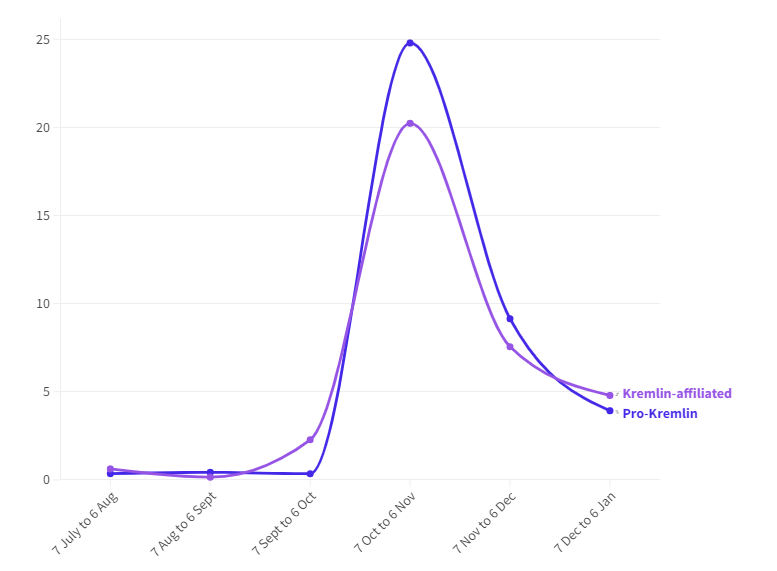
Figure 5: Percentage of posts containing keywords about the Israel-Hamas war in posts about the war in Ukraine.
Accusations of double standards
Even before the Hamas attack on Israel on 7 October, there was content circulating among pro-Kremlin accounts that compared Israel to Ukraine. Both countries were described as having unlimited support from the United States and engaging in terror against ‘disliked’ parts of the population. Tensions between Israel and Palestinian authorities were also used to accuse the West, particularly the United States, of hypocrisy and ‘double standards’ when it comes to international human rights. These narratives stated that while the US was condemning the Russian invasion of Ukraine, it was not applying the same standards for territories occupied by Israel.
Accusations of double standards persisted after the 7 October attack, drawing criticism for Germany’s use of language in condemning Russia for conducting a “war of annihilation” in Ukraine, while failing to employ the same term when addressing Israel, despite the significant number of deaths caused by its attacks on Gaza. Other posts accused the West of dehumanising victims in Palestine, while crying for the people killed in Ukraine.
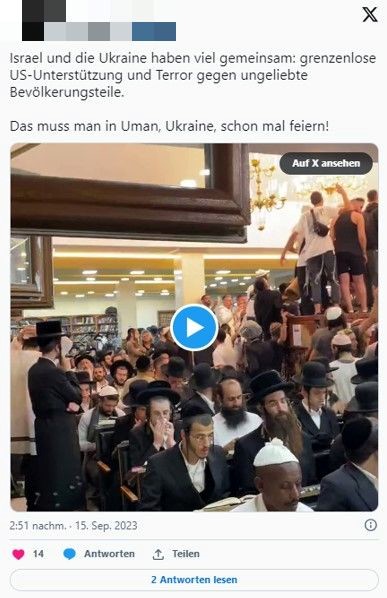
Figure 6: A post published by a pro-Kremlin account on 1 September 2023 reads: “Israel and Ukraine have much in common: unlimited support from the US and terror against unloved parts of the population”.
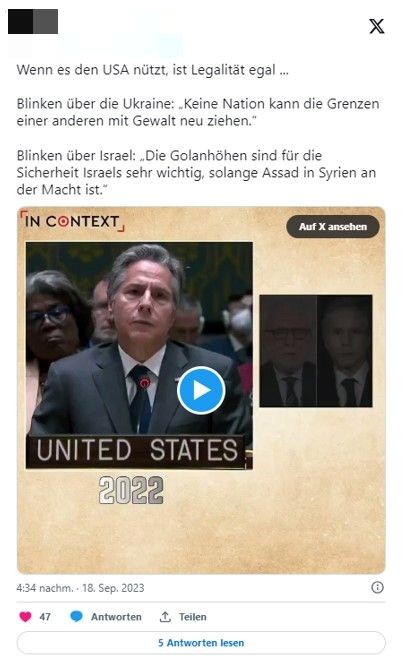
Figure 7: A post published on 18 September 2023 states: “If it benefits the USA, legality doesn’t matter…Blinken on Ukraine: ‘No nation can redraw another’s borders by force.
Blinken on Israel: ‘The Golan Heights are very important for Israel’s security as long as Assad is in power in Syria’.”
By the evening of 7 October, a German-language channel focused on the war in Ukraine had already started its accusations of double standards, stating: “Interesting, what will the international community say about Israel cutting off the electricity supply to Palestinian civilians? If it were the Russians, we would already know what to expect, but in the case of Israel, it’s probably something different, isn’t it?”
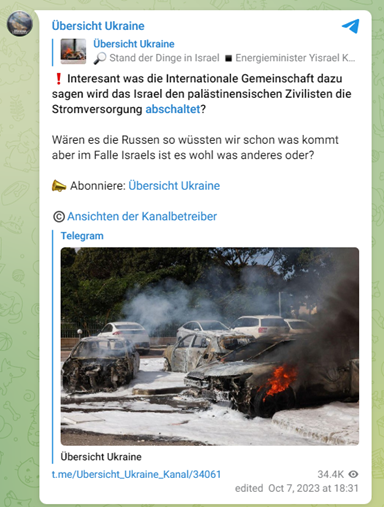
Figure 8: A pro-Kremlin German-language Telegram channel called “Overview Ukraine” states: “Interesting, what will the international community say about Israel cutting off the electricity supply to Palestinian civilians? If it were the Russians, we would already know what to expect, but in the case of Israel, it’s probably something different, isn’t it?”
Accusations of weapons supply to Hamas
In the aftermath of the 7 October attack on Israel, pro-Kremlin accounts exploited the situation to accuse Ukraine of providing weapons to Hamas. Multiple accounts shared content and videos making this claim, and it gained significant traction across platforms. On X alone, ISD identified 213 posts making the claim which obtained a total of 1,260 retweets.
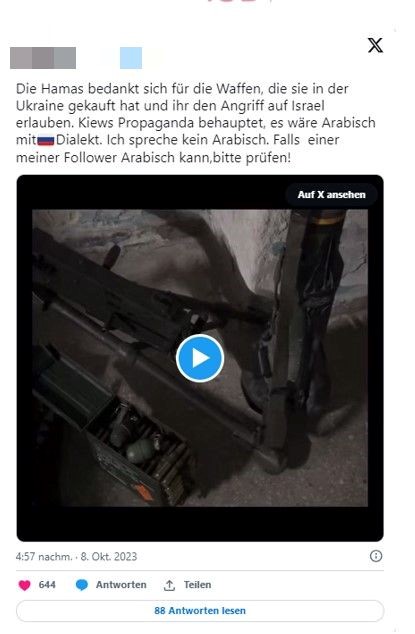
Figure 9: A pro-Kremlin account posted a video on 8 October stating: “Hamas thanks for the weapons bought in Ukraine for allowing the attack on Israel. Kiev propaganda claims it is Arabic with a Russian dialect. I don’t speak Arabic. If any of my followers speak Arabic, please check it.” The post obtained over 600 likes on X.
Facebook’s most shared post among pro-Kremlin accounts also accuses Ukraine of having supplied weapons to Hamas. The post which was shared over 1,200 times in the timeframe analysed mentions online videos of Hamas fighters showing weapons allegedly coming from Ukraine, which according to the post was made possible due to the prevalent corruption in the country.
Kremlin-affiliated accounts also shared the same claim. A news fragment posted by RT DE on Facebook, amplified US Representative Marjorie Taylor Greene’s claims that weapons used by Hamas might have come from Ukraine or Afghanistan.
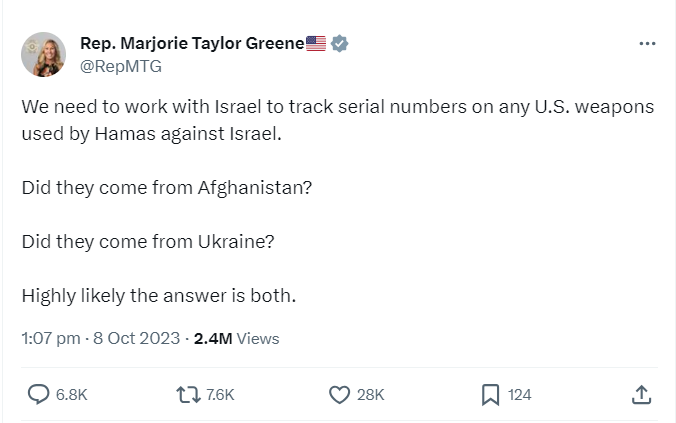
Figure 10: A highly controversial post by US Representative Marjorie Taylor Greene claims weapons used by Hamas “highly likely” came from Afghanistan and Ukraine.
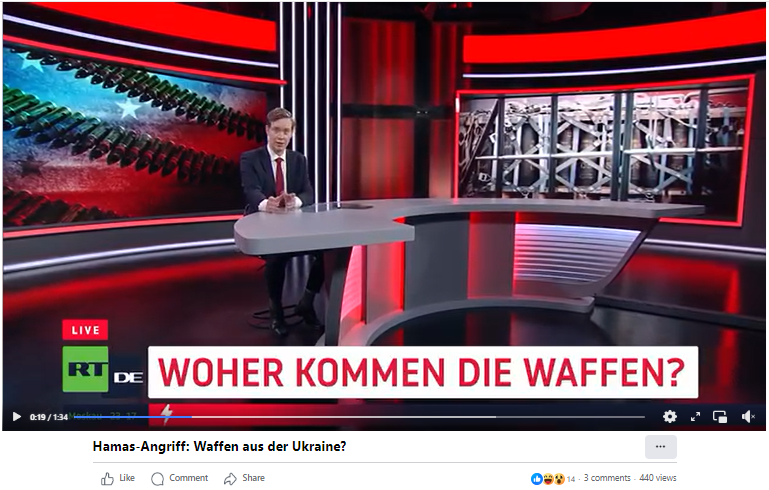
Figure 11: A news fragment published by RT DE amplified US Representative Marjorie Taylor Greene’s claims that Hamas weapons might have come from Ukraine or Afghanistan.
Anti-government narratives
Besides exploiting the situation in Gaza to draw support for Russia, pro-Kremlin accounts also mention both conflicts as examples of perceived wrongdoing to express their dissatisfaction and distrust towards the German government, mainstream media and “the elites”.
A popular post by a pro-Kremlin account, which obtained over 1.7K likes, states: “What is important is not what opinion people have about Covid-19, Ukraine, climate or Israel. What is important to recognise is how these topics are used by the elites to advance an agenda. It is important to fight exactly this.”
Common criticism also included general dissatisfaction towards providing economical support to victims of both conflicts while allegedly neglecting the interests and well-being of the German people. Previous research by ISD has revealed that narratives attempting to portray Germany’s economic situation as dire were a common strategy employed by Kremlin-affiliated operations. By dramatising the current economic reality in Germany, these operations sought to gather support against sanctions on Russia, presenting them as the primary cause for the economic decline and fostering grievances towards the German government.
Accusing the West of being belligerent
Kremlin-affiliated accounts largely covered US partisan differences over aid to Ukraine in the aftermath of the escalation in the Middle East, and also profited from internal disagreements on whether a ceasefire should be called. Western reluctance to do so was exploited to draw parallels between Ukraine and Israel once again.
A post published on Satellit, a spin-off of Russian state media Sputnik, features a series of comments allegedly taken from X where X users show their discontent with the work of Germany’s Minister of Defence Boris Pistorius. One of the comments states: “The West does not want de-escalation in Ukraine or in Israel, even though a genocide is currently taking place there […]”
Content that accused the US and the West in general of being belligerent also included praise for Donald Trump for being “the first president in recent memory not to start a war” and for being the next president who will end the wars in Ukraine and Gaza.
‘Israel planned the Hamas attack’
Another narrative, mainly propagated by pro-Kremlin accounts, suggests that Israel either planned the Hamas attack on 7 October or was aware of it and allowed it to happen to justify its subsequent attack on Gaza. Among prominent posts spreading this narrative is a message allegedly sent to Alina Lipp and shared by the German influencer on her channel. The message claims that in the video shared by Lipp, where an alleged Hamas fighter is thanking Ukraine for the delivery of weapons, the man appears to be speaking Arabic and making numerous grammatical mistakes. According to the author, this suggests that he might be an Israeli rather than a Palestinian, supporting the theory that Israel planned the attack rather than Hamas.
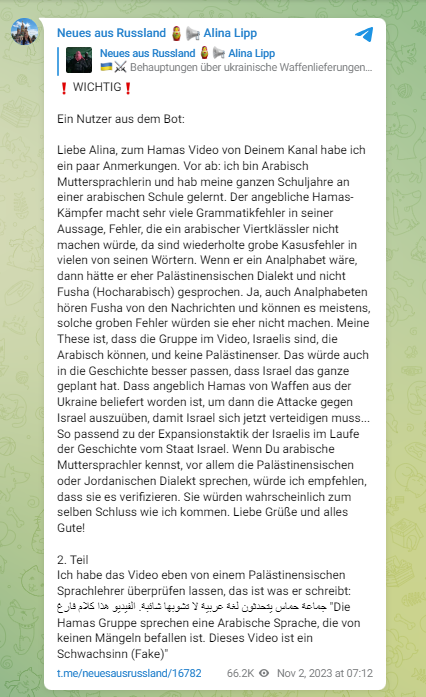
Figure 13: A post published by Alina Lipp’s Telegram channel allegedly sent to her by a user claims the people thanking Ukraine for the weapons sent to Hamas in Arabic might be Israeli citizens.
On Facebook, one of the most shared posts in the timeframe analysed was a video interview with the Israeli independent journalist Efrat Fenigson, a marketing expert who switched to journalism during the Covid-19 pandemic to fill “the [information] gap in mainstream media”. In the interview Fenigson stated that Israeli intelligence agencies knew about the Hamas plan, but “some forces might have enabled it to happen”.
Conclusion
Despite an initial spike in the volume of content produced by pro-Kremlin and Kremlin-affiliated actors about the Israel-Hamas war temporarily diverting attention away from Ukraine, it appears these actors have restored their focus on the Russia-Ukraine war. The conflict in the Middle East has provided opportunities to exploit support for Palestine to align the Palestinian and Russian causes against Western and American ‘hegemony’ and perceived double standards. Additionally, it has become another source of discontent towards Western governments, media and ‘elites’. Further analysis of pro-Kremlin narratives beyond the German language is necessary to comprehend the Kremlin’s tactics and their impact on their community of supporters.
This project was funded by the European Media and Information Fund through the Calouste Gulbenkian Foundation. The sole responsibility for any content supported by the European Media and Information Fund lies with the authors, and it may not necessarily reflect the positions of the EMIF and the Fund Partners, the Calouste Gulbenkian Foundation and the European University Institute.







